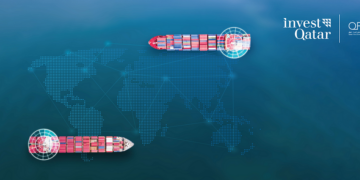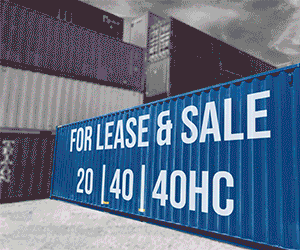
The Covid-19 pandemic has caused unprecedented disruption to global supply chains. The crisis has revealed weak links, but has also shown the benefits of good sourcing practice. Joe Hepworth, Director, OCO Global, and Founder of the British Centres for Business (BCB), highlights some pointers and developments that are changing the face and the landscape of the Supply Chain ecosystem—Editor.
As companies emerge from the sweeping Covid-19 pandemic, it is natural to expect the supply chain sourcing to adapt to drive greater efficacies and resilience.
It is very obvious that Covid-19 has had a profound impact on global supply chains, and the changes we have seen are only the beginning. Changes that are being implemented now are likely to be long lasting and will reshape international trade of the future.
At OCO Global, we have seen seven key trends emerge or come to the forefront this year, that are likely to impact supply chain and logistics as we move forward in a post-Covid world.
AI and Machine Learning
More and more organisations are turning to AI and machine learning to simplify tasks and automate procedures. Gartner reports that in the four years to 2019, there was a 270% increase in the number of organizations using Artificial Intelligence.
Predictive analytics and machine learning algorithms are being used to improve planning and decision support systems, identify purchasing patterns, automate tedious warehousing processes and manage inventory. Many organisations are using AI to replace humans performing repetitive supply tasks and to perform complex supply chain calculations.
Governance and Security
Cyber and digital security are increasingly important as global risk events increase. Privacy is also a major focal point, and a s a result, we can expect to see a range of new solutions emerge for the industry, whether in terms of track-and-trace, smart packaging, RFID and NFC (Near-Field Communication).
Sustainability
Increasingly, we have seen multinational corporations pledging to work only with suppliers that adhere to strict social and environmental standards, ensuring that sustainable practices are implemented throughout the supply chain.
For others, Covid-19 has completely disrupted the supply chain, and as systems are being reviewed and adapted, some organisations are using the opportunity to instil sustainable practices and processes into the chain. Now is an ideal time for everyone to focus on long term sustainable evolution of business processes, rather than short-term quick fixes.
Re-shoring
Re-shoring is the process of bringing manufacturing and part or all of the supply chain back to the home country from a foreign country. Near-shoring is a similar process, but refers to a location near the home country.
There are calls from many industries, associations and the public sector to bring supply chains home. This really came to the fore in March/April when we saw shortages of critical medical supplies around the world, highlighting the risks of relying on foreign or single sourcing, and the indications are there that this will continue to be a popular strategy.
Cloud Solutions
There are many organizations that still rely on legacy on-premise supply chain software, but the future lies in cloud-based solutions, because it allows flexibility, scalability and a global reach – all increasingly important elements of any supply chain strategy these days – without the expense of setting up and maintaining extensive on-site computing infrastructures.
According to McKinsey, cloud-specific spending in 2020 will grow 6x faster than other IT expenditures. These solutions should complement on-premise supply chain software, and provide a better user experience, greater functionality and easy access to new features and developments.
5G Implementation
Compared to its predecessors, 5G is a massive step forward with regard to data speed and processing capabilities. It can be applied throughout the supply chain, from vehicle-to-vehicle communication to tracking items as small as microchips. In the warehouse, pickers can be guided by augmented reality applications that lead them to the correct bin.
Implementing these networks has huge benefits in terms of operational efficiency, particularly in terms of Internet of Things (IoT) and video communications. Running a 5G network in a factory can minimize latency and enhance real-time visibility and IoT capabilities when it comes to track-and-trace, product monitoring, blending indoor and outdoor operations and networks, and using real-time data.
VR/AR Immersive Experiences
Immersive experience technology such as Virtual, Augmented and Mixed Reality has the potential to radically influence the trajectory of supply chain management, helping to improve product and process design, data and process visualisation, employee collaboration, and experience-based learning.
These new interaction models amplify human capabilities, and many companies are already seeing the benefits when it comes to on-boarding new workers through immersive on-the-job training in a safe, realistic virtual environment, for example.
These are the trends we have seen develop over the course of this difficult year, and with so much uncertainty still in the present and around the future, our predictions and trends are sure to evolve and develop as we move through the waves of this pandemic around the world. All we can be sure of is that things will not be the same as they were before.
BOX OUT:
Joe Hepworth
Director, OCO Global, and Founder of the British Centres for Business (BCB)
With responsibilities across all market sectors and multiple regional countries, Joe oversees trade and export support projects across the region and is responsible for delivering the company’s investment attraction services in the region. He also leads the company’s economic development consulting team for the GCC.
As part of Joe’s work with OCO, he holds a number of other important client representational roles in the Middle East. He is Director for Missouri Department of Economic Development in the Middle East; Regional Director for IDA Ireland; Middle East Director for the Connected Places Catapult and has managed the UK’s Department of International Trade regional delivery contract since 2013.
Want to stay updated on the latest industry news and trends? Subscribe today to receive your monthly news highlights directly in your inbox!











